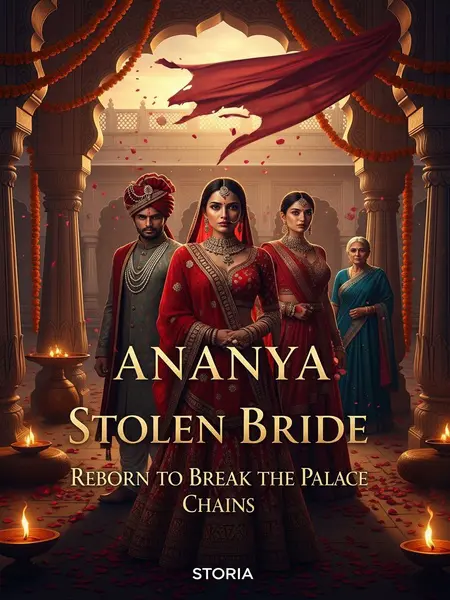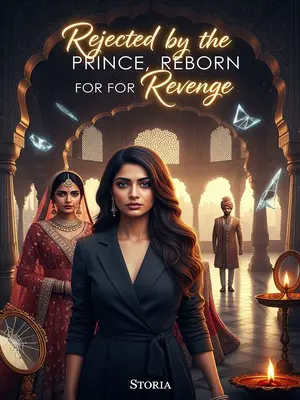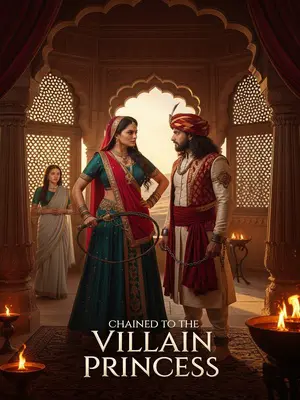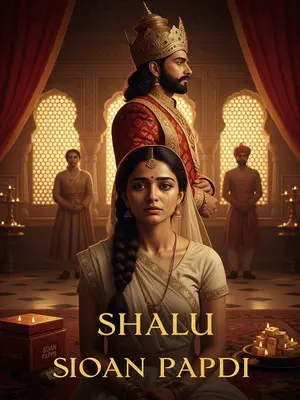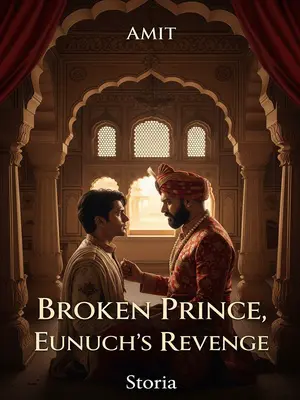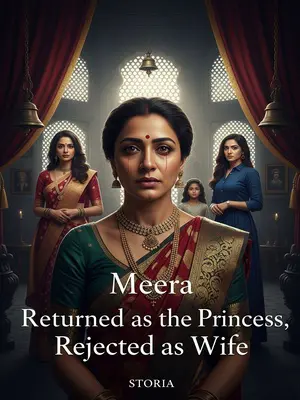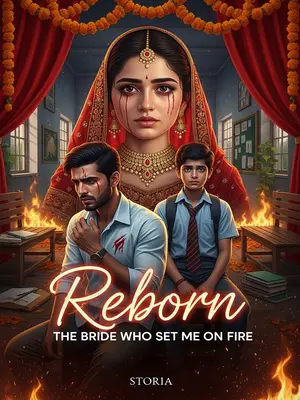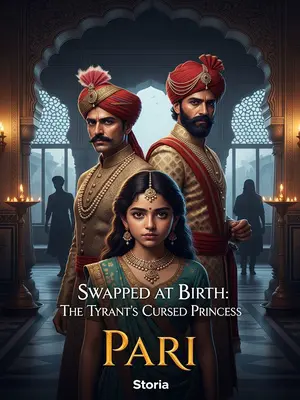Chapter 4: The Kite of Betrayal
Priya has also been reborn.
The realisation hit me like a slap. All the old rivalries, resentments, and ambitions now had a second life. The game had begun anew.
I closed my eyes and sighed softly.
The silence of my room wrapped around me. The old wall clock ticked, slow and relentless. I gathered my shawl tighter, feeling exposed in ways I hadn’t since childhood.
In the previous life, she married Prince Aryan, who was a man of the army—cold and reserved. Every time Priya saw me, she glared with hatred, as if I had stolen her good fortune.
Her eyes would follow me across the courtyard, smouldering with silent accusation. Even her laughter at family gatherings seemed edged with glass.
So in this life, she sought out Kabir early and became his second wife.
She was clever, that one. This time, she played her cards before I could even sit at the table.
She wanted to enter the palace before me and secure her position first.
The urgency in her every move made sense now. She wasn’t just competing for love—she was fighting for survival, for power.
From then on, fate’s path diverged. Little did she know, I never intended to marry the Yuvraj.
Her plotting was wasted. I was not the enemy she imagined, not anymore.
Her schemes against me are doomed to fail.
I almost pitied her—almost. But pity was a luxury I could not afford in this house of secrets.
In the days that followed, I did not go out, but stayed home preparing for my wedding.
The women of the house gathered to help, their chatter filling the halls. Aunties brought new bangles and turmeric paste. Even the family tailor, Nisar Chacha, came to take my measurements, fussing over the length of my sleeves.
I always felt guilty towards Prince Aryan.
He had always been the quiet one, standing in the shadows, his loyalty unwavering. I remembered his shy smile, the way he fixed his gaze on the ground when spoken to.
He, the Yuvraj, and I grew up together. But my eyes were always on the Yuvraj, while Prince Aryan was silent and withdrawn, often overlooked by me.
Even during Holi, when colours flew and laughter rang, Aryan would linger at the edge, watching us play, never daring to join in.
I still remember him standing in the dark storeroom, his black eyes brimming with emotions I could not fathom:
“Anu, if I became king, would you marry me?”
The question, asked in a whisper, lingered in the dust-motes, fragile as a secret. My heart had fluttered, but fear kept my answer locked behind my teeth.
I did not answer—nor could I.
I had been foolish, thinking my silence would save us both. Instead, it doomed him to loneliness.
Prince Aryan held command of the army and was always under suspicion. Kabir lured him into the capital in my name and had him killed.
The news came on a stormy night, the messenger’s face pale, the papers trembling in his hands. My grief swallowed the world whole.
That was his fate in the previous life.
The pain of it never left me. Not even death erased it.
I hope that in this life, we can both find peace.
It was a prayer offered in silence, in the dark, with only the gods as witness.
After the last stitch, I unfolded the peacock-and-lotus patterned red wedding chunari I had just embroidered and gently blew on it.
The silk shimmered in the sunlight. I ran my fingers over the threads, tracing each curve. The design, borrowed from the temple archway, seemed to dance with every breath I took.
Dadi always said my embroidery was poor, so I had specially learnt from the karigars at Zaveri Emporium. This was already my finest work.
The karigars, seeing my dedication, had become fond of me, even teaching me their secret knots. I hoped Dadi would finally praise me this time.
His Highness Prince Aryan—he should like it, shouldn’t he?
I imagined his shy smile, the pride in his eyes. For the first time in years, hope fluttered in my chest.
I was full of anticipation, but never expected my hard work to be trampled so.
It was as if the gods themselves wanted to test my resolve.
When I hurried to Zaveri Emporium to collect the wedding chunari, the karigar smiled and told me the Yuvraj had already taken it.
The shop was bustling with customers buying trinkets for the upcoming festival. The karigar’s words hit me like a slap; I clutched my bag tighter, feeling the world tilt.
Seeing my expression fall, the karigar looked at me in confusion: “His Highness heard you embroidered a wedding chunari for him and was delighted to see it. Why, is something wrong, beti?”
His concern was genuine, but I could barely meet his eyes. The old woman next to me, waiting for her gold bangles, tsked in sympathy.
I closed my eyes, suppressing the anger that surged within, and rushed out.
The street outside was blazing with heat. My slippers slapped against the pavement, and I barely noticed the vendors calling out for customers. The distant cry of a hawker selling nimbu-pani drifted through the air, blending with the city’s pulse.
I don’t know how many people I asked before I finally found where Kabir was.
Every servant, every guard, seemed to be in on some secret. Their eyes slid away, their answers vague. My patience frayed with each step.
The guards stopped me, saying the Yuvraj and his second wife were flying kites and it would not be appropriate for me to go in.
One guard, chewing paan, tried to block my way: “Bitiya, yeh andar ka maamla hai. Aap mat jaiye.” I glared, daring him to try again. The other shrank back, muttering apologies.
I sneered and brushed past them.
My anger blazed hot and righteous. I would not be stopped now—not by rules, not by shame.
On the lush green lawn, a woman was flying a kite, her pale fingers reaching high—soon covered by a large hand. She leaned shyly into his embrace, laughing sweetly.
The scene looked idyllic—a painting come to life. But beneath the laughter, I felt the sharp edge of betrayal, a memory of all that had been stolen from me.
My sudden appearance interrupted their flirting.
Priya’s giggle died on her lips. Kabir’s hand fell away, his smile vanishing as he met my eyes.
The Yuvraj’s face darkened, and he looked at me warily:
His jaw clenched, muscles twitching with annoyance. He stood a little taller, as if that could protect him from the storm brewing in my eyes.
“What are you doing here?”
His words were sharp, meant to cut, but I would not let him see me bleed.
I held out my hand and got straight to the point:
“The wedding chunari—give it back to me.”
My voice was steady, but my heart thundered in my chest. I kept my eyes locked on his, refusing to look at Priya.
He frowned slightly:
“It’s gone. You can just embroider another.”
The casual cruelty of his words stung. My hands balled into fists at my sides. The anger tasted bitter, metallic.
I glared at him, but before I could speak, Priya giggled first.
She covered her mouth with her dupatta, her beautiful eyes sparkling, and pointed to the sky:
“Speaking of which, didi’s embroidered wedding chunari is so beautiful—the only kite of its kind in the city.”
The sweetness of her words was as sharp as a slap. Her eyes glittered with triumph, daring me to protest.
Following her gaze, I was struck as if by lightning.
There it was—the silk, the peacock and lotus, fluttering high above us. I felt as if the earth had slipped from under my feet.
The kite she held aloft was made from my wedding chunari.
The silk shimmered against the blue, brighter than any other. Even the children running on the lawn had stopped to watch it soar.
The bright red silk was dazzling against the blue sky, even the clouds seemed more vivid.
My heart thudded painfully, the ache of betrayal echoing through every bone.
Kabir—
The name caught in my throat. For a moment, all the years of longing and regret returned, sharp as glass.
He actually used my painstaking work to please his beloved.
My vision blurred with rage and heartbreak. I had spent days pouring my hopes into every stitch, only to have it become a toy for their amusement.
Blood rushed to my head, and I felt as though I were drowning in a sea of anger, the grievances of two lifetimes threatening to overwhelm me.
My breath came in ragged gasps. I saw Priya’s smile, Kabir’s indifference, and all the injustice of this life and the last collapsed into one moment.
Unable to contain myself, I shoved him hard, almost screaming:
“That was mine! How could you?”
The words cracked the air like a whip. The servants nearby froze, unsure whether to intervene.
“Are you mad or what—”
He staggered from my push, and his angry retort died in his throat when he saw my reddened eyes.
For the first time, I saw confusion flicker in his gaze. My pain seemed to finally register, if only for a moment.
He had never seen me so emotional before, and for a moment, he was stunned, not knowing what to do.
He looked away, jaw working, as if trying to swallow back his own frustration.
After a while, he frowned and spoke stiffly:
“Enough. It was made for me anyway. If it pleases me, isn’t that enough? Why take it so seriously?”
His voice was flat, almost pleading for an end to the scene. I caught Priya’s smirk from the corner of my eye.
“If you don’t want this one, just embroider another.”
He spoke as if it were nothing, as if my hurt was a trivial thing. I clenched my jaw, fighting for composure.
I trembled with rage, forcing back the tears at the corners of my eyes, choking back my sobs, and looked at him, enunciating each word:
“Who said this wedding chunari was embroidered for you?”
The silence that followed was deeper than any before. Even the kite seemed to falter in the wind, as if mourning what had been lost forever.
And from the rooftop, a lone kite—stitched with peacock and lotus—dipped in the wind, as if mocking my pain.
